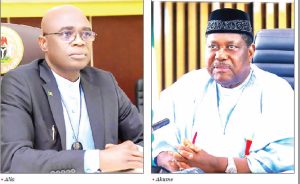 In this article, we delve into the intricate dynamics surrounding the internal crisis within the Benue State chapter of the ruling All Progressives Congress (APC).
In this article, we delve into the intricate dynamics surrounding the internal crisis within the Benue State chapter of the ruling All Progressives Congress (APC).
Last week, Rev Fr Hyacinth Alia, the Governor of Benue State, inaugurated a new state working committee for the APC. Benjamin Omakolo was appointed as the acting chairman in the wake of the removal of Austin Agada, the former state chairman, by his Ehaje council ward. Agada was subsequently restrained by a court order from assuming the position of party chair.
However, this temporary arrangement was short-lived, as the state’s Chief Judge, Justice Maurice Ikpampese, vacated the earlier court order and ordered a return to the status quo ante until the case, which has been assigned to a new judge, is resolved.
Despite the pending case, the state government proceeded to establish a factional secretariat near the Government House in Makurdi, separate from the original party secretariat in the capital city. Omakolo participated in various state functions, both within and outside the state, except those organized by the APC national secretariat.
The APC National Chairman, Alhaji Abdullahi Gadunje, and Vice President Senator Kashim Shetima have made repeated appeals for the warring factions to reconcile and embrace peace. In an effort to resolve the internal crisis, the party’s national secretariat recently directed all members to withdraw their court cases.
In compliance with the directive, the Agada-led working committee filed a notice of withdrawal on March 25, 2024, effectively ending a case filed by the chairman. Meanwhile, the Omakolo faction’s case challenging the decision of the Chief Judge of the state is still pending before the Appeal Court.
Adah Inas, the assistant Publicity Secretary of the Omakolo-led team, confirmed that the case has not been withdrawn and will remain so until the national secretariat addresses a petition regarding Agada’s alleged anti-party activities. Inas emphasized the need for the national secretariat to act on the petition before further steps are taken.
The emergence of Omakolo as the acting chairman stemmed from the suspension of Agada, leaving a void that needed to be filled. This development was marked by the inauguration of the new state working committee led by Omakolo, an event attended by the state governor’s representative, Paul Biam. Biam emphasized that there is no faction within the party and reaffirmed the governor’s leadership role.
The internal crisis within the Benue APC can be traced back to the election of the speaker of the state assembly. Governor Alia’s alleged disregard for party leaders’ advice and preferences was seen as a catalyst for the conflict. Some analysts attribute the crisis to a leadership struggle between Senator George Akume, the Secretary to the Government of the Federation, and Governor Alia.
While the party structure, chaired by Agada, supports Senator Akume, cabinet members and other politicians have rallied behind the governor. Rev Pinot Ogbaji, the APC Benue South Senatorial District Chairman, shed light on the reasons behind the crisis during a recent press conference in Makurdi. Ogbaji criticized Governor Alia for favoring individuals outside the APC who had opposed him during the elections, rather than fostering a harmonious relationship with party members.
It is important to note that the ongoing crisis in the Benue APC is not a personal battle between Alia and Akume or Alia and Agada. Instead, it represents a struggle for the survival and recognition of the party that provided a platform for Governor Alia’s emergence as the leader of Benue State.
The internal strife within the APC in Benue State is a concerning development that threatens the unity and effectiveness of the party. Efforts must be made to address the underlying issues and foster reconciliation among the factions to ensure the party’s stability moving forward.

